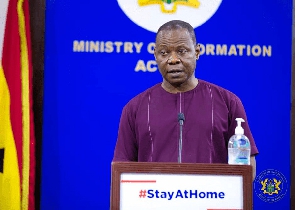 The Director General of the Ghana Health Service (GHS), Dr. Patrick Kuma-Aboagye
The Director General of the Ghana Health Service (GHS), Dr. Patrick Kuma-Aboagye
The Director General of the Ghana Health Service (GHS), Dr. Patrick Kuma-Aboagye, has stressed the need for sustained efforts to enhance research, expand preventive measures, and increase awareness to eradicate HIV/AIDS.
He urged support from all sectors and individuals, both within and outside the health sector, to advance Ghana’s initiatives in HIV campaigns and ensure coverage in every part of the country.
Dr. Kuma-Aboagye Aboagye made these remarks at the opening of the National HIV/AIDS Dialogue Series in Accra.
It was on the theme “20 Years of HIV Antiretroviral Treatment (ART) in Ghana: Celebrating Progress, Advancing Research, and Ending the Epidemic.”
Dr. Kuma-Aboagye stressed the importance of not only celebrating the 20 years of HIV antiretroviral treatment but also focusing on the urgent path ahead towards eradicating HIV in Ghana.
He reflected on how two decades ago, HIV was seen as a death sentence that destabilized families and presented insurmountable challenges.
However, through the commitment of the government, dedication of healthcare professionals, resilience of patients, and unwavering support of partners, remarkable progress has been made.
Dr. Kuma-Aboagye said that the dialogue series served as a vital platform for public education and mobilising communities to eliminate stigma and misinformation surrounding HIV/AIDS.
He said that access to treatment and adherence had saved countless lives and enabled many individuals to lead healthy and productive lives.
However, he stressed that achieving success also requiresd sustained partnerships, financial commitment, and a robust national health infrastructure.
Dr. Kuma-Aboagye said that prevention remained the most effective and sustainable approach to ending the pandemic.
“As a country, we must invest in high-impact prevention strategies that include community education and empowerment,” he said, advocating for a national movement to encourage everyone to be vigilant, informed, and actively involved in the fight against HIV.
“We must utilize the media, community programs, and digital platforms to bring HIV back to the forefront of public health efforts and discussions and promote self-testing as a game-changer.
“In recent years, self-testing has emerged as a powerful tool, that can break down barriers such as stigma and fear, hence the need for a supportive environment, increased access, and education on its benefits,” he stated.
Dr. Kuma-Aboagye called for increased research to drive innovation in efforts to end the epidemic.
“We must be relentless in exploring new and better ways to prevent, treat, and ultimately eradicate HIV in Ghana.
“In our efforts to strengthen research infrastructure, the GHS was working towards establishing two new centers in Western North and Savannah regions to boost the number of research centers and focus on locally driven research, tailored to specific context and the needs of the people,” he stressed.
Dr. Stephen Ayisi Addo, Programme Manager of the National AIDS and STI Control Programme, reported that since the introduction of antiretroviral therapy (ART), over 300,000 people across the country had received treatment, with approximately 157,000 individuals currently on ART.
He said the treatment had led to many people were living healthy lives, prevented deaths and mother-to-child transmission, improved survival rates among children, alleviated burdens on families, reduced healthcare costs, and decreased the number of orphans.
Mr. Ayisi Addo said the programme had reduced stigma, contributed to enhanced social and family lives.
“So, if we are celebrating, it is not just a fluke, or about numbers, but about human lives, and impact on the individual.”
Dr. Frankline Asiedu-Bekeo, Director of Public Health at the Ghana Health Service, stated that the dialogue series showed the commitment and resilience that had shaped Ghana’s public health response over the past two decades.
He noted that through research, knowledge about HIV had deepened, leading to evidence-based treatment models that save countless lives, highlighting the decline in new infections and an increase in treatment coverage.
The dialogue series would provide an opportunity to reflect, strategize, and renew the commitment to ending the epidemic.
It aims to enhance focus on robust research, community engagement, and equitable access to treatment and prevention, ensuring that no one is left behind.